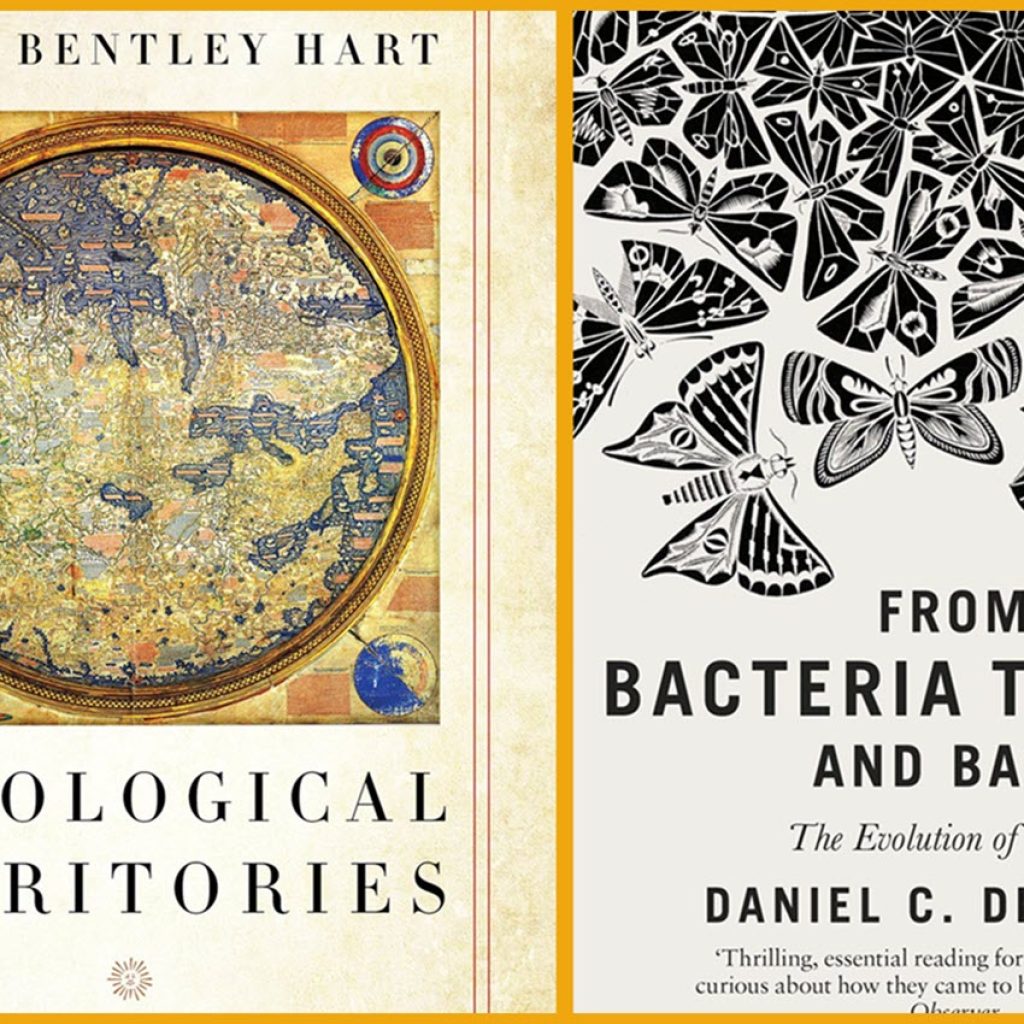Trinitarian semantic intent in the Prologue of John’s Gospel arrives in An Exemplary Case of the Untranslatable as per the premises in the following excerpt/quote from “The New Testament: A Translation” by David Bentley Hart ((…Amazon https://www.amazon.com/New-Testament-David-Bentley-Hart-ebook/dp/B0767CPR6H/ …))
Begin Quote/Excerpt
A Note on the Prologue of John’s Gospel
An Exemplary Case of the Untranslatable
There may perhaps be no passage in the New Testament more resistant to simple translation into another tongue than the first eighteen verses—the prologue—of the Gospel of John. Whether it was written by the same author as most of the rest of the text (and there is cause for some slight doubt on that score), it very elegantly proposes a theology of the person of Christ that seems to subtend the entire book, and that perhaps reaches its most perfect expression in its twentieth chapter. But it also, intentionally in all likelihood, leaves certain aspects of that theology open to question, almost as if inviting the reader to venture ever deeper into the text in order to find the proper answers. Yet many of these fruitful ambiguities are simply invisible anywhere except in the Greek of the original, and even there are discernible in only the most elusive and tantalizing ways. Take, for example, the standard rendering of just the first three verses. In Greek, they read, 1Ἐν ἀρχῇ ἦν ὁ λόγος, καὶ ὁ λόγος ἦν πρὸς τὸν θεόν, καὶ θεὸς ἦν ὁ λόγος· 2οὗτος ἦν ἐν ἀρχῇ πρὸς τὸν θεόν· 3πάντα δι᾽ αὐτοῦ ἐγένετο, καὶ χωρὶς αὐτοῦ ἐγένετο οὐδὲ ἓν ὃ γέγονεν· (1En archēi ēn ho logos, kai ho logos ēn pros ton theon, kai theos ēn ho logos; 2houtos ēn en archēi pros ton theon; 3panta di’ avtou egeneto, kai chōris avtou egeneto oude hen ho gegonen.) I am aware of no respectable English translation in which these verses do not appear in more or less the same form they are given in the King James Version:
“1In the beginning was the Word, and the Word was with God, and the Word was God. 2The same was in the beginning with God. 3All things were made by him; and without him was not any thing made that was made.”
Read thus, the Gospel begins with an enigmatic name for Christ, asserts that he was “with God” in the beginning, and then unambiguously goes on to identify him both as “God” and as the creator of all things. Apart from that curiously bland and impenetrable designation “the Word,” the whole passage looks like a fairly straightforward statement of Trinitarian dogma (or at least two-thirds of it), of the Nicene-Constantinopolitan variety. The average reader would never guess that, in the fourth century, those same verses were employed by all parties in the Trinitarian debates in support of very disparate positions, or that Arians and Eunomians and other opponents of the Nicene settlement interpreted them as evidence against the coequality of God the Father and the divine Son. The truth is that, in Greek, and in the context of late antique Hellenistic metaphysics, the language of the Gospel’s prologue is nowhere near so lucid and unequivocal as the translations make it seem. For one thing, the term logos really had, by the time the Gospel was written, acquired a metaphysical significance that “Word” cannot possibly convey; and in places like Alexandria it had acquired a very particular religious significance as well. For the Hellenistic Jewish philosopher Philo, for instance, it referred to a kind of “secondary divinity,” a mediating principle standing between God the Most High and creation. In late antiquity it was assumed widely, in pagan, Jewish, and Christian circles, that God in his full transcendence did not come into direct contact with the world of limited and mutable things, and so had expressed himself in a subordinate and economically “reduced” form “through whom” (δι᾽ αὐτοῦ [di’ avtou]) he created and governed the world. It was this Logos that many Jews and Christians believed to be the subject of all the divine theophanies of Hebrew scripture. Many of the early Christian apologists thought of God’s Logos as having been generated just prior to creation, in order to act as God’s artisan of, and archregent in, the created order. Moreover, the Greek of John’s prologue may reflect what was, at the time of its composition, a standard semantic distinction between the articular and inarticular (or arthrous and anarthrous) forms of the word theos: the former, ὁ θεός (ho theos) (as in πρὸς τὸν θεόν [pros ton theon], where the accusative form of article and noun follow the preposition), was generally used to refer to God in the fullest and most proper sense: God Most High, the transcendent One; the latter, however, θεός (theos) (as in καὶ θεὸς ἦν ὁ λόγος [kai theos ēn ho logos]), could be used of any divine being, however finite: a god or a derivative divine agency, say, or even a divinized mortal. And so early theologians differed greatly in their interpretation of that very small but very significantly absent monosyllable.
Now it may be that the article is omitted in the latter case simply because the word theos functions as a predicate there, and typically in Greek the predicate would need no article. Yet the syntax is ambiguous as regards which substantive should be regarded as the subject and which the predicate; though Greek is an inflected language, and hence more syntactically malleable than modern Western tongues, the order of words is not a matter of complete indifference; and one might even translate καὶ θεὸς ἦν ὁ λόγος as “and [this] god was the Logos.” But the issue becomes at once both clearer and more inadjudicable at verse 18, where again the designation of the Son is theos without the article, and there the word is unquestionably the subject of the sentence. Mind you, in the first chapter of John there are also other instances of the inarticular form where it is not clear whether the reference is the Father, the Son, or somehow both at once in an intentionally indeterminate way (as though, perhaps, the distinction of articular from inarticular forms is necessary in regard to the inner divine life, but not when speaking of the relation of the divine to the created realm). But, in all subsequent verses and chapters, God in his full transcendence is always ho theos; and the crucial importance of the difference between this and the inarticular theos is especially evident at 10:34–36. Most important of all, this distinction imbues the conclusion of the twentieth chapter with a remarkable theological significance, for it is there that Christ, now risen from the dead, is explicitly addressed as ho theos (by the Apostle Thomas). Even this startling profession, admittedly, left considerable room for argument in the early centuries as to whether the fully divine designation was something conferred upon Christ only after the resurrection, and then perhaps only honorifically, or whether instead it was an eternal truth about Christ that had been made manifest by the resurrection. In the end, the Nicene settlement was reached only as a result of a long and difficult debate on the whole testimony of scripture and on the implications of the Christian understanding of salvation in Christ (not to mention a soupçon of imperial pressure).
Anyway, my point is not that there is anything amiss in the theology of Nicaea, or that the original Greek text calls it into question, but only that standard translations make it impossible for readers who know neither Greek nor the history of late antique metaphysics and theology to understand either what the original text says or what it does not say. Not that there is any perfectly satisfactory way of representing the text’s obscurities in English, since we do not distinguish between articular and inarticular forms in the same way; rather, we have to rely on orthography and typography, using the difference between an uppercase or lowercase g to indicate the distinction between God and [a] god. This, hesitantly, is how I deal with the distinction in my translation of the Gospel’s prologue, and I believe one must employ some such device: it seems to me that the withholding of the full revelation of Christ as ho theos, God in the fullest sense, until the Apostle Thomas confesses him as such in the light of Easter, must be seen as an intentional authorial tactic. Some other scholars have chosen to render the inarticular form of theos as “a divine being,” but this seems wrong to me on two counts: first, if that were all the evangelist were saying, he could have used the perfectly serviceable Greek word theios; and, second, the text of the Gospel clearly means to assert some kind of continuity of identity between God the Father and his Son the Logos, not merely some sort of association between “God proper” and “a god.” Here, I take it, one may regard chapter twenty as providing the ultimate interpretation of chapter one, and allow one’s translation to reflect that.
End Quote/Excerpt (…from “The New Testament: A Translation” by David Bentley Hart…)
Related Content:
John 1, Christology, Jehovah’s Witnesses, Bruce Metzger, Michael Marlowe, YHWH, and Theological Appraisals at https://metachristianity.com/wp-content/uploads/2024/04/john-1-christology-jehovahs-witnesses-bruce-metzger-michael-marlowe-yhwh-and-theological-appraisals-pdf.pdf
Joining The Eternal Conversation John’s Prologue And The Language Of Worship by Robert W Jensen at https://metachristianity.com/joining-the-eternal-conversation-johns-prologue-and-the-language-of-worship/
Also:
Two items looking at Trinity In The Gospels (…”God In The Flesh In The Gospels”…)
1 of 2: The following is from a comment section, specifically https://disqus.com/home/discussion/standtoreason/our_existence_as_relational_beings_points_to_the_trinity/#comment-2980707845
2 of 2: The following are excerpts from a comment section, specifically https://disqus.com/home/discussion/standtoreason/our_existence_as_relational_beings_points_to_the_trinity/#comment-2982785079
Those two items are included in the PDF listed earlier for easier reference: John 1, Christology, Jehovah’s Witnesses, Bruce Metzger, Michael Marlowe, YHWH, and Theological Appraisals at https://metachristianity.com/wp-content/uploads/2024/04/john-1-christology-jehovahs-witnesses-bruce-metzger-michael-marlowe-yhwh-and-theological-appraisals-pdf.pdf






No comment yet, add your voice below!